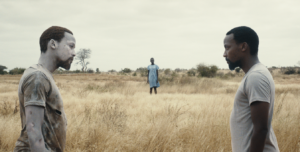 Review: Wisconsin Film Festival
Review: Wisconsin Film Festival
Kati Kati | Mbithi Masya | Kenya, Germany | 2016 | 75 min
Sundance Cinemas, Friday, March 31, 8:45PM»
Sundance Cinemas, Thursday, April 6, 2:45PM»
Kati Kati delivers a high concept ghost story set in a mysterious limbo between life and afterlife, from a new generation of African filmmakers who make a strong case for more indigenous filmmaking. Emily Caulfield continues our 10-day Wisconsin Film Festival preview with her review.
Widely lauded at its premiere in the Discovery Program at this year’s Toronto International Film Festival, Kati Kati has gargantuan ideas and shows even bigger promise. Spectacularly shot on location in Kenya, Mbithi Masya’s short feature about a detour in the afterlife is an emotionally expansive film, but shot so intimately that it speaks in a shorthand that might elude general audiences.
Produced by Run Lola Run director Tom Tykwer’s One Fine Day Films, an African filmmaking initiative he began in Nairobi in 2008, Kati Kati begins as dreamy, creepy ghost story. Our heroine Kaleche (Nyokabi Gethaiga) appears in the middle of a deserted grassland wearing a blue hospital gown. She wanders over to what appears to be an old safari lodge, and finds forgotten sign up sheets and swimming pool instructions. It’s dark and spooky and then boom! We hear a sound. Kaleche discovers people inhabiting the resort. She meets them as they play a round of charades. Oh hello, they say. Welcome to Kati Kati. We’re all dead and you are too.
If this were a trailer for an action movie, the bass would drop right here. Baoowwww bwa bwa bwa bwa bwa baowwww. The dead joke with each other that Kaleche looks like a runner, and, indeed, she turns and bolts away from them.
She hits an invisible barrier just beyond the lodge. Her new colleagues gather around her, joking and watching the newcomer. They know the drill, but we understand this monumental news from Kaleche’s perspective. Her addled brain that cannot remember what happened, or how she died. A new name—Kaleche Miano—and a new set of dates appear on the old sign-up board. We get it now: the board lists the residents, along with the dates of their births and deaths.
Kaleche finds guidance from Thoma (Elsaphan Njora), the enigmatic, charismatic part-time leader of this ragtag team. He seems to have been there the longest, and knows how the place works. “Is this hell?” Kaleche asks him as he helps her settle in. “No,” he chuckles.”You better get some rest, Kaleche.”
He brings her to breakfast and to chill with the others around the pool. Kaleche watches, participates, but she remains the awkward, new, other. Thoma takes an interest in her and their chemistry is instantaneous, magnetic. At least I couldn’t take my eyes off them: why’s he always looking at her like that?
The rest of the 20 or so inhabitants at the lodge encourage Kaleche to remember her past. They suggest that she will pass on to the next stage of her journey when she does so. Here’s where, at least for me, the details get more tangled than a knot in a snake. Everyone’s journey seems to include the working out of guilt of some kind, but there’s no cohesive logic to it worked out across the residents.
Mikey (Paul Ogola) wears a graduation cap and gown in every scene, because he died before he graduated. He also continues to despair over his strictly religious mother. King (Peter King Mwania), a former pastor, confronts the ghosts of his own past, connected to political violence. Guilt burdens both of them, but they seem headed for vastly different places on the next leg of their journey. I can’t say we ever quite learn the answers to how the afterlife works; it truly is unanswerable, even, it seems, in a world where the director is god.
Despite these ambiguities, Kati Kati is intimately, warmly shot. Each scene delivers a genuine depth of feeling—so much so that the essential tone of the film seems to change in turn. Kaleche’s influence on the group, especially Thoma, has set something in motion that changes Kati Kati irrevocably. But what that change is, we’re not exactly sure.
I can’t pin a genre on Kati Kati. I rebranded it several times across two viewings. I know romance and horror can often be one in the same, but rarely is it so hard to figure out. Scary, loving, foreboding, melancholy, sweet. You get the notion that these young filmmakers just want to say anything and everything and it’s all just out there, and not necessarily with much exposition or context. I love the urgency and its attendant poeticism in this film, even when it seems to come crashing in out of the lavender Kenyan sky.
The highlights of the film—the tempest of images, the hurricane of sound—make more lasting impressions than the film as a whole. Perhaps owing to first-time director Mbithi Masya’s art, music, and video background, he treats us to sumptuously shot sequences of life at the lodge that feel like 90s music videos—basketball, horsing around in the pool—and we feel hopeful and exuberant. Formal passages feel like a children’s theater production of The Walking Dead, possibly due to co-writer Mugambi Nthiga’s theater upbringing. Bloodless yet terrifying scenes reveal the past, scored with a bizarre soundtrack of unrelenting and disorienting tones.
Kati Kati heralds a new class of filmmakers, a crop of fresh new voices rethinking high Hollywood concepts, African filmmakers bringing their local and cultural content to the global stage. It’s a thrilling moment in film history, more about what can happen now, while we’re all players, than about the afterlife at all.